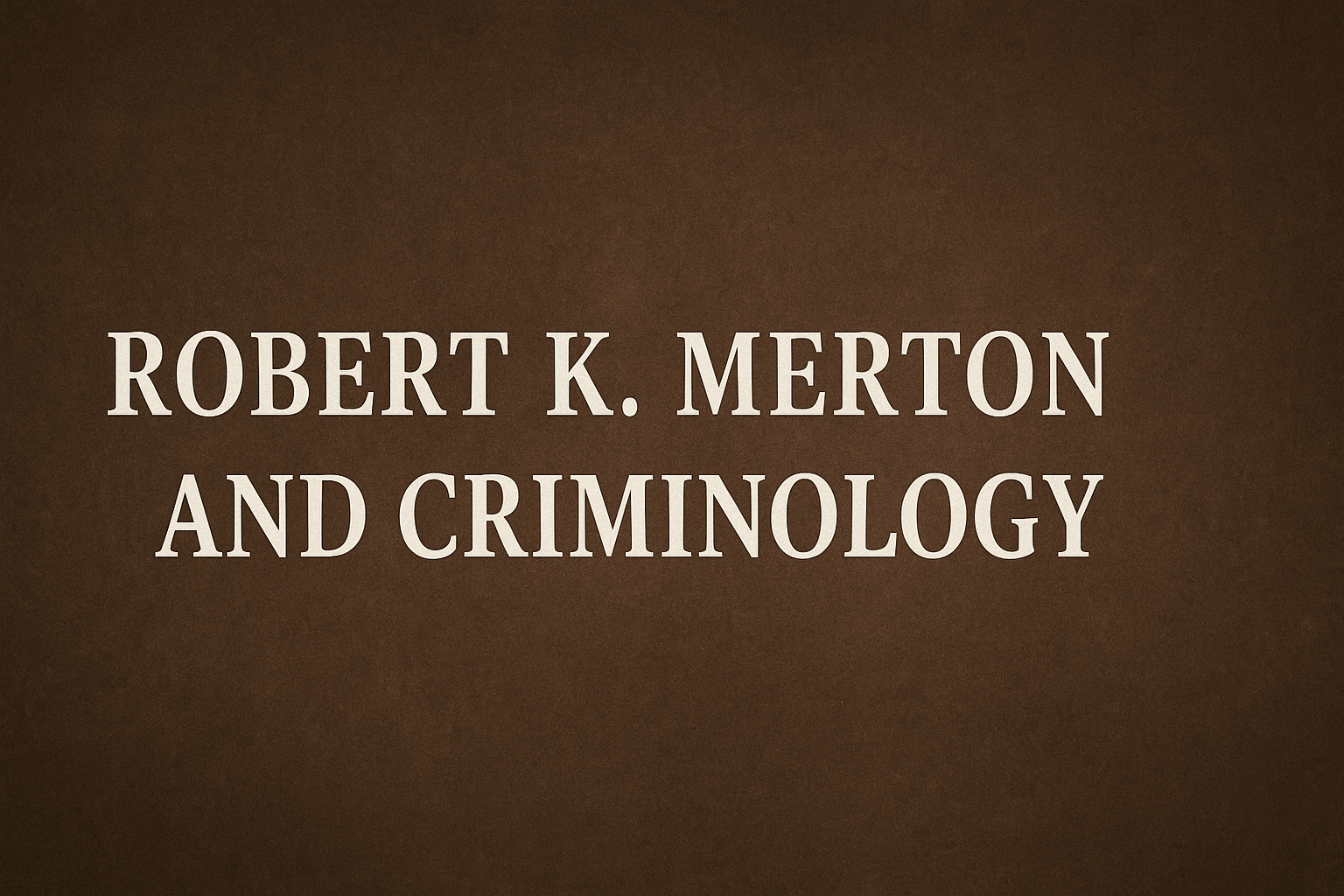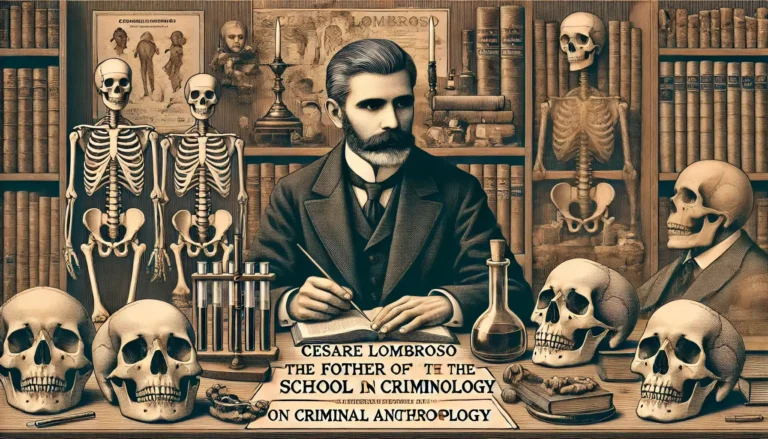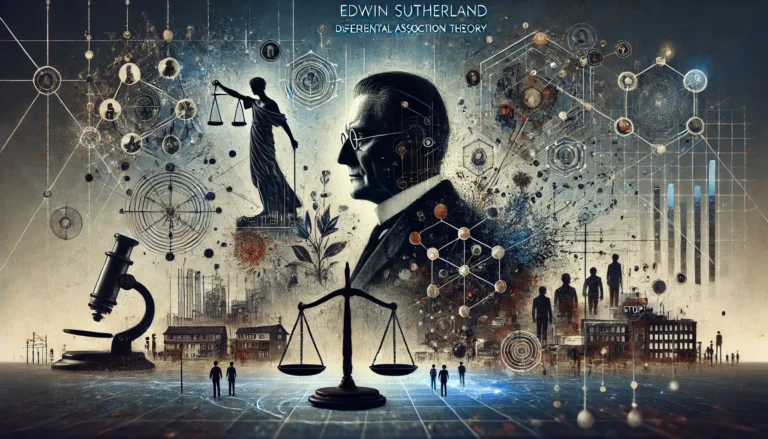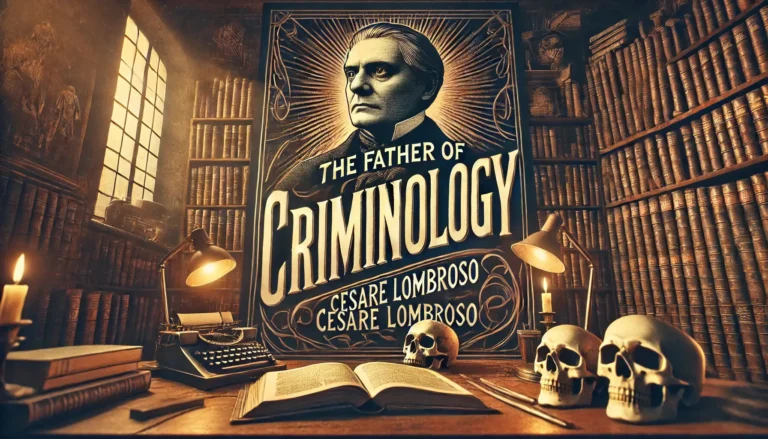Robert K. Merton and Criminology: Contributions, Theories, and Impact
Introduction
Robert K. Merton stands as one of the most influential sociologists of the 20th century. His theories and concepts, particularly in the realm of criminology, have shaped the way scholars and practitioners understand the roots of deviant behavior. Known primarily for his Strain Theory, Merton offered a framework for analyzing how societal structures contribute to criminal behavior. This article explores Merton’s life, his contributions to criminology, and the lasting impact of his theories on the study of crime and society.
Robert K. Merton: A Sociological Pioneer
Born in 1910 in Philadelphia, Pennsylvania, Robert K. Merton (originally Meyer R. Schkolnick) was a trailblazer in sociology. His academic journey began at Temple University, followed by Harvard University, where he studied under renowned sociologist Pitirim Sorokin. Merton’s early exposure to influential thinkers laid the foundation for his groundbreaking contributions to sociology and criminology.
Merton’s career included teaching positions at Tulane University and Columbia University, where he became a key figure in the sociology department. His work extended beyond criminology, encompassing topics such as the sociology of science and the concept of self-fulfilling prophecies. However, it was his analysis of social structures and deviance that solidified his reputation in criminology.
Strain Theory: A Cornerstone in Criminology
Merton’s Strain Theory, introduced in 1938, remains one of the most significant contributions to criminological theory. At its core, Strain Theory posits that societal structures and cultural expectations create pressures that can lead individuals to engage in deviant or criminal behavior.
Core Concepts of Strain Theory
Merton argued that societies establish culturally approved goals—such as wealth, success, and social status—while simultaneously dictating legitimate means of achieving these goals. When individuals face a disconnection between these goals and the means available to achieve them, strain occurs. This strain can manifest in various forms of deviance, including criminal behavior.
For example, in societies where material wealth is a dominant goal, individuals who lack access to education, employment, or other legitimate avenues may turn to illegal activities such as theft or drug trafficking to achieve financial success.
Applicability to Criminology
Merton’s Strain Theory offered a new lens through which to analyze crime. It shifted the focus from individual pathology to structural factors, emphasizing the role of inequality and social organization. This perspective proved especially valuable for understanding crime in urban and economically disadvantaged communities.
Adaptations to Strain: Modes of Individual Response
One of Merton’s most notable contributions is his identification of five modes of individual adaptation to strain. These adaptations describe how people respond to the disconnection between societal goals and legitimate means:
- Conformity: Accepting both cultural goals and legitimate means, conformists abide by societal norms despite the strain they may face.
- Innovation: Accepting cultural goals but rejecting legitimate means, innovators often resort to criminal behavior to achieve success.
- Ritualism: Rejecting cultural goals but adhering to legitimate means, ritualists follow rules without aspiring to societal success.
- Retreatism: Rejecting both cultural goals and means, retreatists withdraw from societal participation, often through substance abuse or isolation.
- Rebellion: Rejecting existing goals and means, rebels seek to establish new social norms and structures, sometimes through radical or revolutionary actions.
These modes provide a framework for understanding diverse pathways to deviance, offering insight into why some individuals resort to crime while others do not.
Criticism and Evolution of Merton’s Theory
While Merton’s Strain Theory has been widely influential, it has also faced criticism. Some scholars argue that the theory overemphasizes societal structures and neglects individual agency. Others point out that it focuses primarily on economic strain, overlooking other sources of stress such as family dynamics, peer pressure, or psychological factors.
In response to these critiques, researchers have expanded upon Merton’s ideas. For instance, Robert Agnew’s General Strain Theory incorporates emotional and psychological dimensions, exploring how negative relationships and personal experiences contribute to deviance. This broader perspective has enhanced the applicability of strain-based theories to contemporary criminological research.
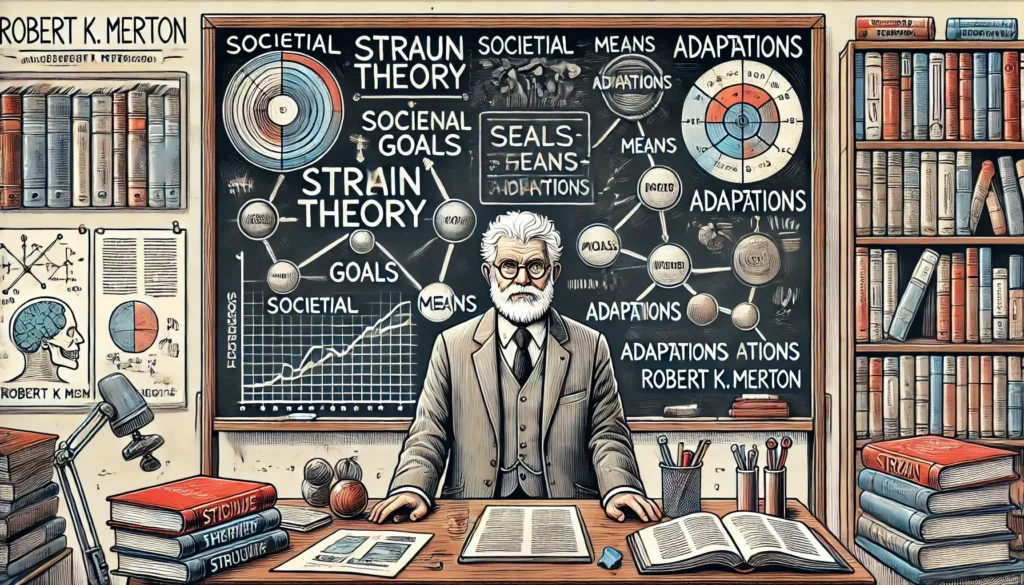
Merton’s Broader Influence on Criminology
Beyond Strain Theory, Merton’s contributions to criminology extend to other areas of sociological inquiry. His concept of anomie, which describes a state of normlessness or social instability, has been pivotal in understanding crime in rapidly changing societies. Additionally, Merton’s emphasis on the interplay between societal expectations and individual behavior has influenced policy development, particularly in addressing social inequality and crime prevention.
Merton’s work also paved the way for subsequent theories that link structural factors to crime, such as subcultural theories and social disorganization theory. His influence can be seen in the work of scholars like Clifford Shaw and Henry McKay, who explored how neighborhood dynamics shape criminal behavior.
Conclusion
Robert K. Merton’s contributions to criminology have left an indelible mark on the field. His Strain Theory and related concepts provide a powerful framework for understanding the relationship between societal structures and deviant behavior. By highlighting the role of inequality and cultural expectations, Merton’s work continues to inform criminological research, policy-making, and efforts to address crime in diverse contexts.
As criminology evolves, Merton’s insights remain relevant, offering a foundation for exploring the complex interplay between society and individual behavior. His legacy as a sociological pioneer endures, shaping the way we understand and address the causes of crime in modern society.

